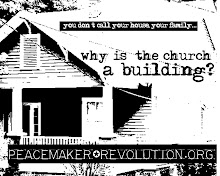by Austin Pfeiffer
Why hate on the mega churches? Its a good question. Citizens are not ambivalent to these constructs. Some in America find a strange pride in the size of their church, as if to imply it might give credence to the legitimacy or talents of its leadership and members. Others are quick to create a legalistic standard of rebuke against their relevance or necessity. Whenever young radicals want to create a standard, they are dangerously limiting possible future considerations. Just because an idea is progressive does not make it open minded and Paul understood this when he said, "everything is permissible, but not everything is beneficial."
So where can we land on mega churches? The definition of a mega church fluctuates, but lands somewhere between 1000-2000 people attending the church in weekly worship. My contention? If we are to be intelligent and reasonable, we must admit mega churches are certainly permissible as a means of living out Jesus' ideas. Are they beneficial? For the most part, no. To start with a metaphor, can you repair a dam with play-doh and a hammer, certainly it is possible, but is it the best understanding of how to execute the exercise at hand?
In our time the Church has become a space of individual service. The mega church is a place where people can certainly come and in effectively designed ways hear compelling points about Christianity, but in many ways they stifle the most fundamental purposes of the church. First, these institutions spend enormous amounts of money on administrative staff members, paper for communication and publicity, and require insane amounts of effort to simply keep the organization solvent. If it desires to make a swift movement in a direction of purpose, it is not possible, because keeping the staff paid and relevant, to justify the buildings on a campus, they are incapable of flexing. Of course you could argue because of their stature they are more equipped to make large impacts. Yes, they may have the resources, but the accessibility is not there and the consensus of people and bureaucracy of ownership will inevitably stone wall progress.
We are not talking about some radical deconstruction of all churches which ignores scripture or seeks to trivialize the Bible's claims into completely literal and blanket ideas. If churches are a place where people worship, then a space with thousands of dollars in speakers and choreographed music leaves little to the corporate expression. People cannot hear each other singing in unison, and the priesthood of the microphone creates a leadership hierarchy in pageantry, not expression of a culture. If churches are a place where the hurting, hungry, and naked come, then a place where the pastors need to be reached by phone in a corner office, the kitchen is a vacant space that never sees the stranger from the street, and the buildings have no clothing closet, are functioning in a bloated fashion and missing the point of church in the first place.
So can a mega church work? Of course, the question is, do their kitchen's serve the homeless? Do their buildings house the homeless? Can a stranger talk to their leaders? If the culture of a church is to create an organization that attracts people, they will attract those whose children can be entertained or whose hearts find the recreation of live music pleasant, but no, they will not make room for the homeless, the stranger, the hurting of the neighborhood they exist in. Are they permissible, yes, beneficial? I will take a chance and say no.
.jpg)






2 comments:
the primary problem with the mega-church is that it commodifies following Jesus.
the only mega-churches i have come across that don't do so are those that plant, which is not very many.
I agree that the main grievance of the mega church is the hidden truth behind its walls. In the proclamation to reach more with more resources one finds the truth is, those resources are largely squandered. The larger question is: What does it mean to have resources? As you point out, are those resources truly used for the needy, poor in heart, the widowed and the fatherless? Usually they are not. For comparison’s sake, let’s look at seminary. Does ones life dedication to the study of scripture equate a strong Christian or the hearts call to Christianity? No. Can it, yes at times it does. Can it indeed point to one who is proud of the depth of their intellect, instead of humbled by the Maker? Absolutely. As Solomon said, with knowledge comes pain, pain from those who understand the deeper call of Christendom. This call is the necessary sacrifice of our personhood, our possessions, our time and our will. If you can not easily see how this call, pronounced by Christ, is found in your life or respective place of worship, perhaps you haven’t sacrificed at all.
~Julie Leacock
Post a Comment